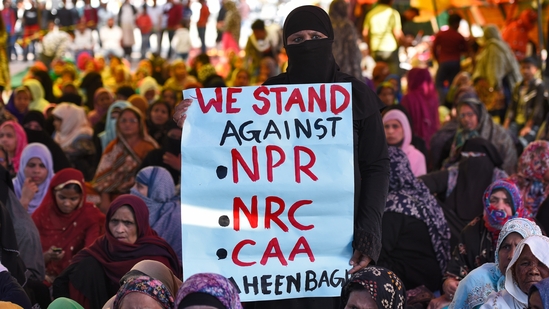CAA rules to be notified 'much before' Lok Sabha polls: Reports
Last month, Union home minister Amit Shah reiterated that no one can stop the implementation of the CAA as it is the law of the land.
The Central government is ready with the Citizenship Amendment Act (CAA) 2019 rules and is likely to implement them "much before" the Lok Sabha elections slated to take place this year, a senior government official told news agency PTI on Tuesday.

"We are going to issue the rules for the CAA soon. Once the rules are issued, the law can be implemented and those eligible can be granted Indian citizenship," the official said.
The CAA regulations, which were introduced and passed four years ago by the Narendra Modi-led union government, aim to confer Indian nationality to persecuted non-Muslim migrants - including Hindus, Sikhs, Jains, Buddhists, Parsis, and Christians - who migrated from Bangladesh, Pakistan, and Afghanistan who entered India till December 31, 2014.
The official said that the rules are likely to be notified much before the announcement of general elections. "The rules are ready and the online portal is also in place and the entire process will be online. The applicants will have to declare the year when they entered India without travel documents. No document will be sought from the applicants," the official said.
Last month, Union home minister Amit Shah reiterated that no one can stop the implementation of the CAA as it is the law of the land.
While addressing a gathering in Kolkata, Shah emphasised that the BJP is committed to implementing the CAA. He had also accused West Bengal chief minister Mamata Banerjee of misleading people on the issue. The TMC leader has been opposing the law since its introduction.
The assurance of implementing the much-anticipated CAA was a significant electoral agenda for the BJP during the previous Lok Sabha elections.
Since 2020, the home ministry has often been seeking extensions from the parliamentary committees to continue the process of framing the rules associated with the legislation.
The passage of the bill triggered massive protests in the country as a particular section of citizens objected to the exclusion of Muslim migrants in the bill. The protestors called the bill “discriminatory" and an attack on the secularism of India. Over a hundred individuals lost their lives either during the protests or due to police action
The protesters claimed that the government is working with the assumption that Muslims can't be persecuted, if they are the majority in a country, whereas that is not true for communities like Ahmadiyya in Pakistan or Hazaras in Afghanistan, who face religious persecution in their countries.
As per the Ministry of Home Affairs annual report for 2021-22, between April 1, 2021, and December 31, 2021, as many as 1,414 individuals from non-Muslim minority communities from Pakistan, Bangladesh, and Afghanistan were granted Indian nationality through registration or naturalisation under the Citizenship Act, 1955.
Under the 1955 Act, Indian citizenship by registration or naturalisation is granted to non-Muslim minorities from Pakistan, Bangladesh, and Afghanistan in nine states such as Gujarat, Rajasthan, Chhattisgarh, Haryana, Punjab, Madhya Pradesh, Uttar Pradesh, Delhi, and Maharashtra.
(With inputs from ANI, PTI)






